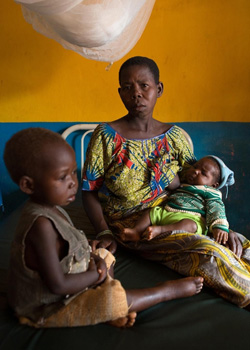Central African Republic: Two out of five children without vital aid - UNICEF
A year after extreme violence tore through the Central African Republic, two out of five children in urgent need of UNICEF’s support are without vital humanitarian aid – according to the agency.

Florence breastfeeds her son while her 2-year-old baby receives treatment for severe malnourishment in the southern town of Boda in Central African Republic.
UNICEF says a critical lack of funding and insecurity – such as road barricades, looting and attacks against aid workers – have left children they expected to help this year without access to essential health services, water, education and protection.
“Children in the Central African Republic are no longer making headlines, but over 2.5 million of them continue to live in constant fear,” said Manuel Fontaine, UNICEF Regional Director for West and Central Africa. “They have little access to essential services and rely entirely on humanitarian aid. As we prepare to mark the New Year, we must seize the chance to give these children a better future.”
With less than half of the required emergency funding received this year, and limited humanitarian access due to violence, UNICEF struggled to deliver vital life-saving assistance that communities needed.
◾620,000 people were unable to receive basic healthcare and medicines
◾250,000 people were unable to access improved sources of water
◾33,000 children were not vaccinated against measles
◾5,000 severely malnourished children under-five could not be treated.
At the peak of the crisis, fighting and widespread clashes forced nearly half a million children to flee their homes. The conflict has torn apart communities across the country, leaving in its wake destruction and a collapse of basic services. According to UNICEF, an average of at least one child was killed or maimed every day this year in the Central African Republic. Up to 10,000 children were recruited by armed groups.
“Behind the horror of rape and killings, there are many teachers, vaccinators, social workers, doctors on the frontline who take risks every day for children,” said Manuel Fontaine. “Without support, their life-saving work is under threat, and we are likely to lose most of what we have achieved this year.”
Together with local authorities and partners, UNICEF was able to make life-saving services accessible to thousands of families in need. Close to 1.4 million people received medicines; more than 1 million children were vaccinated against polio; approximately 550,000 mosquito nets were distributed to protect families from malaria and over 22,300 severely malnourished children received therapeutic treatment.
At the same time, the crisis is spreading across borders. In the past 12 months, violence has caused 188,000 new refugees to flee into neighbouring Cameroon, Chad, Democratic Republic of Congo and Congo. Over 80 per cent of the people fleeing violence across borders are children and women. In addition, about 430,000 people who have fled their homes remain displaced within the Central African Republic itself. Over 16,000 people from minority populations remain under siege in enclaves surrounded by armed groups.
UNICEF is appealing for US$72 million for 2015 to be able to carry out its emergency programmes in Central African Republic, which aim to re-build social services, protect civilians, engage communities to foster reconciliation and promote peace.
Source: United Nations Children's Fund
- 406 reads
Human Rights
Fostering a More Humane World: The 28th Eurasian Economic Summi

Conscience, Hope, and Action: Keys to Global Peace and Sustainability

Ringing FOWPAL’s Peace Bell for the World:Nobel Peace Prize Laureates’ Visions and Actions

Protecting the World’s Cultural Diversity for a Sustainable Future

Puppet Show I International Friendship Day 2020

